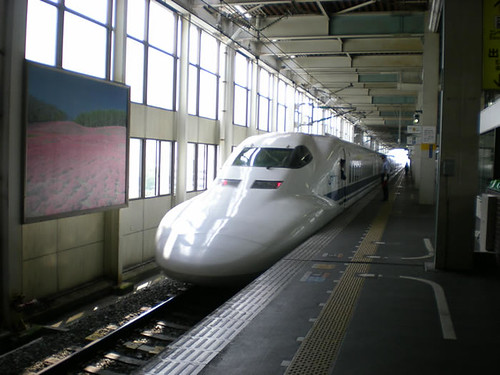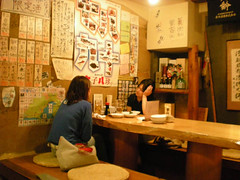Someone wrote me and help organize a trip to Japan .
What I can say is bring back the mia esperienza. Prima cosa fissare un biglietto aereo non troppo caro per il Giappone. Io ho comprato il volo per Tokyo diversi mesi prima e l'ho pagato 830 euro. Dopo aver cercato su Internet ho deciso di rivolgermi in agenzia.
 Contemporaneamente ho ordinato (in agenzia) il Japan Rail Pass . Una tessera che si compra solo fuori dal Giappone. E' una specie di interrail: si puo' girare liberamente su tutti i treni del Giappone, compreso lo Shinkansen (è escluso soltanto un tipo di treno superveloce). Ha una durata che puo' essere di 1,2 o 3 settimane.
Contemporaneamente ho ordinato (in agenzia) il Japan Rail Pass . Una tessera che si compra solo fuori dal Giappone. E' una specie di interrail: si puo' girare liberamente su tutti i treni del Giappone, compreso lo Shinkansen (è escluso soltanto un tipo di treno superveloce). Ha una durata che puo' essere di 1,2 o 3 settimane. Noi l'abbiamo comprato di 3 settimane per un costo di circa 375 euro.
It 's very convenient because it allows to run as well on line Yamamoto of Tokyo (which is an elevated subway that runs around the center of Tokyo), on some ferries (for example, that for the island of Miyajima) and also trains local . whereas a round trip from Tokyo to Kyoto can 'cost 300 euro .. we understand the savings.
Tolte these large costs, life is very expensive in Japan. With powerful
euro against the yen, you can do a holiday in Japan 20 days with a budget of maximum € 2500 (with some small shrewdness).
I ryokan are similar to our bed and breakfast and there are nice at a reasonable price. Besides being a pleasant experience (you sleep on the floor on futons, eating meals prepared at home ..) is the only way to soak up a bit 'in Japanese culture.
A ryokan in Kyoto you can stay close to the temples with a maximum of € 40-45 per head.
Even hot el in Japan are quite affordable. It 's true that there are no hotels dear, but there are very well-kept hotel, clean, well-appointed (to the west) to less than 100 € the double room. We have been in a hotel chain Hokke, for 42 € per person (without breakfast). The rooms were lovely, the staff nice and gave us a lot of things: the yukata (summer kimono) and slippers, green tea, and a special "present for lady" which contains face mask, bath salts, complimentary toiletries, towel, etc. saponcino fragrant. .
 The thing that is cheaper than the food .
The thing that is cheaper than the food . If you do not claim to fancy restaurants, eat in Japan is fairly inexpensive.
Lunch is spent to exaggerate 5-7 € per person (eat lots) and dinner a little more.
drinks do not pay hardly ever: just sitting in a restaurant, bring water or green tea for free, in abundance. Only alcoholic beverages cost as much. The menus are in Japanese, but sometimes have photos or reproductions of plastic plates, then you can order with them.
In any case, even if you happen to order something like that, the plates cost so little that you can 'order something else.
Council to write two or three terms of things like that ( gohan, yakitori, sushi, Tsukune ...) and try to ask. Vocabolarietto an Italian (or English) - Japan may 'be useful.
Economical and fun to eat, you go in zakaya : small inns where you can have dinner with local food and sometimes they split the table with other guests.
At lunch you can 'opt for a sandwich or salad to buy in family mart supermarkets are open 24 hours at 24. They are well stocked and offer practical things to take away. In the case are then given chopsticks or cutlery, sauces, napkins, spoons .. (I often bought jogurtino for a snack!).
The advice I give is to buy several guides in Italy, and will then decide day by day to go. To fix the offices of JR trains are where the staff is nice even if they do not speak English will try to understand and be understood. The important thing is that one always double-check the dates and names of cities, often wrong!
Some of these offices (eg in Kyoto station) are open till late, at about 23:30.
 Turn in early Tokyo subway can 'be a bit' confusing, but once you learn a few points of reference, since it is not so impossible. The JR then the monitor with the words in both English and Japanese , with lots of travel time in minutes per stop. Even in the train stations there are bilingual monitor.
Turn in early Tokyo subway can 'be a bit' confusing, but once you learn a few points of reference, since it is not so impossible. The JR then the monitor with the words in both English and Japanese , with lots of travel time in minutes per stop. Even in the train stations there are bilingual monitor. For the rest, Japan is a safe country , we have traveled far and wide to the sun and we never risked anything. You have to be a bit 'flexible and patient, but everything works perfectly: the train timetable split the minutes.
0 comments:
Post a Comment